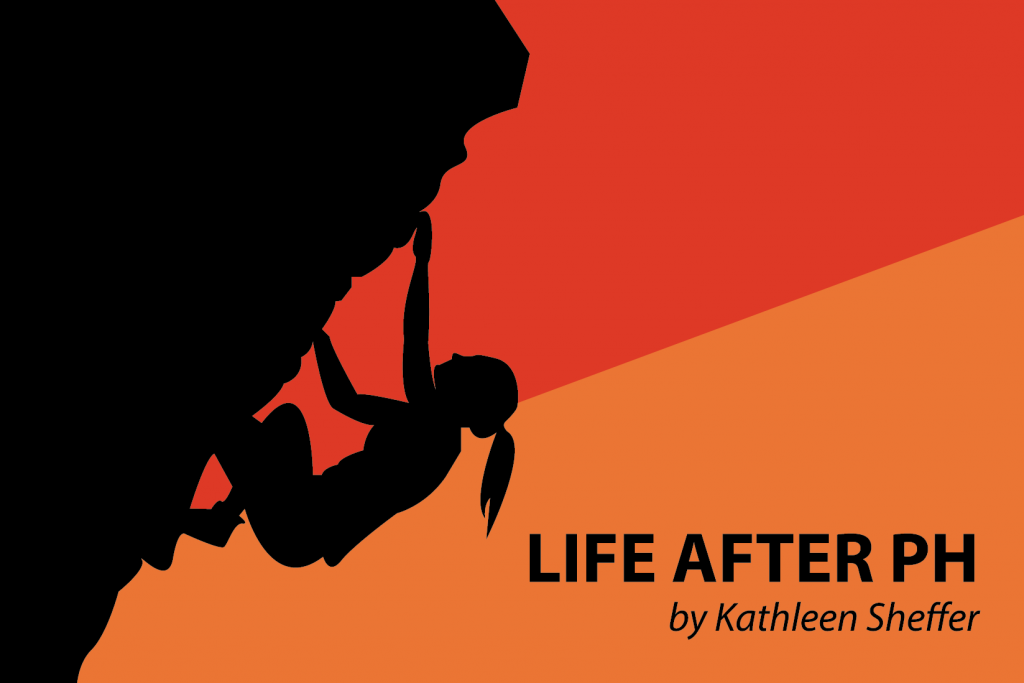On the Importance of Being Transparent

Friends supporting "Team Kathleen" at San Francisco 02 Breathe Walk, 2016. (Courtesy of Kathleen Sheffer)
Cackling, my classmates point at my face. “You look like a ghost!” one sneers. Confused, with no access to a mirror, I ignore their taunting and turn back to my work. When I feel the nausea creeping through me, I know something is wrong. Instinctively, I reach down to feel the tubing through the fabric of my shirt. Wet. Uh-oh.
Later, I would learn that I had turned ghost-white when my intravenous Flolan wasn’t getting through my Broviac catheter to my heart. That afternoon, way back in second grade, a connection in my tubing broke and the medication was leaking out.
The drug has a six-minute half-life, so I started to feel the effects of withdrawal quickly. My mom rushed to the school to replace the tubing, our house conveniently — and intentionally — only a couple blocks away. We sat in an empty classroom until I started to feel better.
That event set off a lifelong habit of transparency about my condition. My mom and I gave presentations about pulmonary hypertension to my class every year thereafter. We explained how the disease affected me, and what classmates could do to help in the event of an emergency — namely, inform someone who could get ahold of my parents. In middle school, I began presenting to all six of my classes myself. The process was intimidating, but always warranted a positive response.
I’ve been trying, unsuccessfully, to think of a time when educating my peers paid off — when one of my classmates really helped me out. Perhaps they never did — I knew better than anyone what I needed and how to get it. But these presentations took a lot of stress off me. They transformed my illness from an invisible secret to a topic of discussion. My candor eliminated any imagined need to hide my pump. I took the questions all at once, and told my classmates to ask my mom if they had more.
November is PH Awareness Month. Raising awareness is a form of survival for me.
In college, I needed my roommates to know about PH. Of course, it was pretty conspicuous when I pulled out a tray of supplies and began using needles and syringes to prepare the medication for my pump. Between midnight trips to emergency rooms and frequent deliveries of oxygen tanks, my disease inevitably factored into my living situation.
Now that I am immunosuppressed to protect my transplanted organs, it’s critical that my friends understand my susceptibility to infection so they won’t come over to my house when they’re sick, or take bites of my food.
When an inebriated young man with a charming European accent blocks my path at a party to ask me about my mask, I politely explain the reason. Honestly, I’m taken aback that he cares about my flimsy filter mask at a party where a space helmet and inflatable T-Rex costume are universally accepted. The young man insists, to his companions’ dismay, that he can’t understand what I’m saying. He starts repeating, “I can’t hear you. I just asked you your name.” Friends come to my rescue and echo my explanation. They encircle us, trying to protect me and keep me moving toward the rest of our group. Gratitude for my friends eclipses my annoyance with the man’s drunken behavior.
Involving my friends in my disease strengthens our bond. They’ve shown up for early morning fundraisers and visited me in the hospital. Reactions to my medical emergencies have come along way from mocking my ghost-like appearance.
***
Note: Pulmonary Hypertension News is strictly a news and information website about the disease. It does not provide medical advice, diagnosis, or treatment. This content is not intended to be a substitute for professional medical advice, diagnosis, or treatment. Always seek the advice of your physician or other qualified health provider with any questions you may have regarding a medical condition. Never disregard professional medical advice or delay in seeking it because of something you have read on this website. The opinions expressed in this column are not those of Pulmonary Hypertension News or its parent company, Bionews Services, and are intended to spark discussion about issues pertaining to pulmonary hypertension.










Joanne
Great article Kathleen! My friends are in on my situation too and many times I've noticed I was running out of my subQ medication while out, so I ask them to please make sure I text them after I get home to confirm I've gotten there and have installed a new syringe. I have a fear of a car accident or breakdown and running out of meds! Bless them all, I'm so lucky to have their love & support. Sounds like you've got that too!
Vanessa Vaile
Thank you for this article, Kathleen. I'm in the process of slowly letting others at the Manor in on it. Most had already noticed my breathing problems and how I carry a lightweight folding seat with me when I walk.